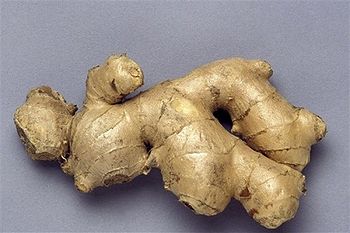Ginger Oil
From Wikiwel
The root of Ginger (Zingiber officinale) is traditionally steam distilled to produce ginger Essential oil,
Special Precautions of Ginger Oil
- As long as it's not used in very strong concentrations, ginger oil is generally safe, as it is non-toxic and non-irritating. If you have sensitive skin, please do a skin patch test before using ginger oil (or any essential oil, for that matter) to see if you have any allergic reactions to it.
- You should also consider diluting ginger oil in a carrier oil like olive or coconut oil. It also blends well with citrusy and spicy essential oils like neroli, frankincense, bergamot, ylang-ylang, rose, and sandalwood.
- Ginger oil may be phototoxic, so avoid applying it on skin areas that will be exposed to the sun within 24 hours after application.
- pregnant women and nursing moms should use ginger oil with caution, even though it has been deemed useful for morning sickness. Consult your healthcare provider before use. Avoid administering this oil to very young children as well.
- If you have any sensitivity to ginger root, do not use ginger oil at all. Some potential side effects of ginger oil are heartburn, sores in mouth, nausea, and skin rashes (when applied topically). If you are taking any type of medication, consult your physician first if it is safe to use or ingest ginger oil.
Health Benefits and Uses of Ginger Oil
Ginger oil's many benefits are attributed to its anti-inflammatory, digestive, expectorant, antiseptic, carminative, analgesic, and stimulating properties. It's helpful in alleviating various health problems, such as:
- Stomach and bowel related problems — Ginger oil helps promote proper digestion, and can be a great remedy for spasms, dyspepsia, indigestion, and flatulence. It can also increase your appetite, which is great for people who are trying to gain weight.
- Food poisoning — Ginger oil's antiseptic and carminative properties can help treat food poisoning, as well as intestinal infections and bacterial dysentery.
- Malaria and yellow fever — A study found that ginger oil can help repel Anopheles culicifacies mosquitoes, which is the primary carrier of malaria in India.
- Respiratory problems — Ginger oil can help relieve and treat coughs, flu, asthma, breathlessness, and bronchitis. Fresh ginger can actually remove mucus from throat and lungs, and is commonly added to tea for its soothing effects.
- It is often used for nausea - either morning sickness or travel sickness.
- For poor circulation.
- Pain — Ginger and ginger oil can help reduce prostaglandins, which are the compounds associated with pain. * Helps ease muscle aches and pains.....especially those caused by colds and flu.
- to help treat arthritic and rheumatic pain.
- Heart ailments — Using ginger oil regularly can help reduce your risk of blood clots and arteriosclerosis, as well as help decrease the bad cholesterol levels in your blood. Adults who consume ginger daily may lower their risk of coronary heart disease by 13 percent, with the probability of illness decreasing when daily ginger intake increased.
- Hypertension — Adults who consume ginger daily have an 8 percent lower risk of developing hypertension (high blood pressure). A 2005 study found ginger may lower blood pressure through blockade of voltage-dependent calcium channels.
- Chronic disease — Research published in the journal Nutrition suggests daily intake of 2 to 4 grams of ginger daily may help prevent chronic diseases.
- Skin Care : Dilute in a carrier oil and use on the skin to help get rid of bruises. Good for balancing moisture in the skin.
